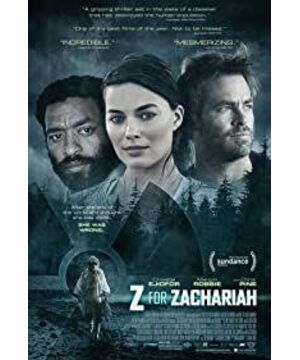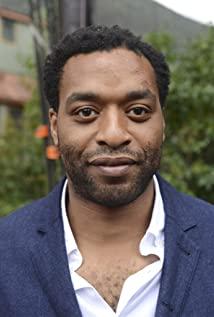The following contains spoilers. Most of the apocalyptic themes we are familiar with come to an abrupt end after the protagonists find the last paradise on earth—the protagonists travel thousands of miles to find the last land after the flood; the lone survivors endure hardships, and finally survive with other survivors. The people's new world will converge; or the disaster that has ravaged the world will eventually fade away, and humanity will face a new era. In these stories, paradise is only a glimmer of hope that makes up the character's motivation, never showing its true face. In Zechariah, however, the story begins precisely when the hero finds his pure land.
This gave Zacharias a unique perspective-the story of a farm girl who lived in perhaps the only peach blossom garden after the nuclear crisis, and two strange interlopers, one after another. Therefore, before clicking on the film, the question is also obvious: what kind of chemical reaction and conflict will there be between the three people? From which angle will the film approach the theme? From which angle will it unfold? According to the thinking of genre films, will this be a small, fresh literary film or a cruel human nature story?
In the film, Ann lives alone in an empty valley after the nuclear crisis. All the conveniences of modern society have disappeared, and life has returned to primitiveness, hand farming and hunting, and candlelight. Using her tricycle as a tool, she walked to the town library, and when she returned, she vigorously scrubbed the poisonous dust off her body. Despite the difficulty, it seemed she could handle it. Ann is also a devout believer and firmly believes that God has his own arrangement for every living being, and there must be a clear explanation of this catastrophe in God's book. The church left by her father is her spiritual support. In this isolated valley, Ann must have thought about whether she was the last survivor on earth. She endured the horror and suffocation of loneliness, but God is her soul mate. With this metaphysical solace, as well as the farm girl's skills and strength, Ann barely maintains the balance of her life.
The sudden intrusion of Engineer Loomis upset the balance. Ann was kind to this strange interloper. This comes from both her kindness and her loneliness. Her prayers to God are clear: "Please grant this person health; please grant me company." And Loomis brought her not only company, but also the improvement of life and the conflicts that followed. As the opposite of Ann's beliefs, Loomis' image is very clear as soon as he appears. He is a government co-engineer, and he has a very different understanding of everything from Ann. From a scientific point of view, he tried to explain why the valley where Ann lived was free from nuclear pollution. He taught Ann to get fuel from the gas station, and he proposed the project of using water conservancy to start the engine. But this needs to bring down the church, so the contradiction arises—Loomis disapproves of Ann's belief and cannot understand it. Although he tries to persuade from Ann's point of view, it does not sound sincere. After all, what he knows so well is that he is not a believer, just some wordplay. Loomis was frustrated by this, and after the drunken vent, he and Ann seemed willing to take a step back from each other, so the turbulent relationship temporarily returned to balance. But the seeds of unease have been planted.
The balance between Ann and Loomis is fragile at this time, wrapped in ambiguity. The lingering sexual tension between the two accelerates after a delightful dinner—but everything remains ambiguous. Ann took the initiative, but what was the reason for her initiative, and Loomis' refusal also made it difficult to see his intentions. At that time, we remembered that they were not men and women under normal social conditions, but two lonely creatures in the last days. Their thoughts and feelings are all shrouded in the dark cloud of nuclear pollution. It is inevitable for the relationship between people to be alienated—strangers have a sense of dependence almost at the speed of light, and they are intertwined with many doubts. They desperately want to trust each other and keep each other warm, but there is a layer of fear of each other in the background. In this world where all the rules have disappeared, who knows what the other party is thinking and what they will do?
Obviously, Ann didn't understand her motives either. She certainly has a fledgling dependence on Loomis (it's you, she says to Loomis, that makes me want to do it all over again), but it's hardly love. Her approach to Loomis is more of a self-suggestion, maybe loneliness, maybe a momentary emotion, or maybe a feeling that this is a necessity between the two (in the absence of external interference forever). Loomis clearly saw Ann's confusion, and he knew his own. He knew he wanted Ann, but he couldn't tell the motive behind it. When he can't be sure of what he wants, it's not worth the gain to destroy the fragile balance of the two just on impulse.
This chaos and contradictions are accelerated to a critical point because of the appearance of Caleb. Two men and one woman seem to be doomed to an unstable structure. With the third party at this juncture, audiences tend to expect a more villainous character, but Caleb is clearly not. He had been watching Ann and Loomis for days, and all he had done was steal a few eggs. But Caleb is very different from Loomis, enough to bring a storm. He is white, young, good-looking, close to Ann's background, shares the same beliefs, and more importantly, he is very decisive and knows what he wants. He can joke with Ann and understand Ann better when it comes to beliefs. Caleb persuaded both sides with a few words on the waterwheel issue that had formed a stalemate between Ann and Loomis. His dialogue with Ann about God shows his logical coherence between faith and practicality. It can also be said to be cunning. He seems more cunning and street-smart than Loomis, and won't be deceived by Loomis' lame lies. He quickly decided that he wanted Ann and wanted to stay.
The communication between the three is surging, and the center of gravity is quietly shifting. The rare relaxing night after the waterwheel was built; candlelight, delicacies, dancing, games, night swimming; Ann enjoying herself; Caleb unrestrained; Loomis' eyes twinkling; the attraction between Ann and Caleb can be seen by the blind. He suddenly becomes a third party. Caleb felt a lethal attraction to Ann, and the awkward sexual tension between her and Loomis was naturally rubbing off on him. She was still confused, and even with Loomis' explanation afterwards, she still couldn't explain herself clearly. Loomis' confession seems to have lost its meaning to her. The former Ann may be ecstatic, but now Ann has experienced temptation, and she understands that her dependence on Loomis is only because there is no one else around.
The symbol of the Garden of Eden is clear from the beginning of the story. After the catastrophe, human beings lost their past identities and status, and people returned to the beginning of creation as simple men and women. In this valley that seems to be favored by God, Ann is Eve, and Loomis is the lucky Adam. They only have each other. The next intruder, Caleb, is the snake that lured Eve. And everything had already been foreshadowed. Loomis in the study opened the Bible book, A for Adam. That page is Adam and Eve in the Garden of Eden, and the snake is peeping from the tree. Eve stole the forbidden fruit, just like Ann and Caleb had an affair.
Loomis is very generous in "giving" Ann permission to do with Caleb what she wants, but this kind of generosity has an unspoken premise that Ann can explore, he can accept, but Ann needs to come back to him eventually. This was made clear in his showdown with Caleb, which he imagined was what he allowed Ann to do. On the one hand, he really is powerless to stop Ann's behavior. On the other hand, Loomis can forgive Ann for trying to seduce him, but he can't tolerate snakes.
So the ending is inevitable—Loomis and Caleb cannot coexist. As absurd as it may seem, the valley is big enough to feed three people, and Caleb has proven himself very useful. However, there doesn't seem to be a second way to go anyway. For Caleb, it was either stay or die. Both understand this. The return of balance seems to have to come at the cost of one's life. This is the absurdity and sharpness of the relationship between two men and one woman in this apocalypse.
The ending is ambiguous, but I, like most people, thought Loomis let go and killed Caleb. What is intriguing is Caleb's eyes behind the protective suit. Facing Loomis' realization, "I can kill this person at this time," his eyes are clear and not surprised. It seemed that he had been waiting for this moment. Just like the story told by two people at the dinner table, Loomis has the ability to choose cruel actions when necessary, and while Caleb has experienced the killing of each other in the mine, and it is not surprising that death will come again, he has already calculated his own destiny. At that moment on the cliff, the two seemed to have reached some kind of subtle consensus.
The story goes back to peace. However, Ann is no longer simply ignorant. She must know Caleb's whereabouts, but there is no evidence, and there is no need to prove anything. The Garden of Eden is no longer pure, and it is no longer appropriate to use Adam and Eve to define Loomis and Ann. The future of the two in this apocalypse is truly unknown.
In the end, it seems impossible to really answer what kind of story this is. Neither too warm nor very cruel. The picturesque scenery, the quiet wilderness, and the communication between characters are all turbulent, but it is difficult to really understand the director's intentions. To put it bluntly, the script seems to touch on a lot of themes, but it's too afraid to go deeper into any one direction. Every point is an understatement on every point, slipping by with no effort, no sharp edges or deep excavations; all treatments are speculative, ambiguous, and secretly anxious.
It can be seen that the three actors tried their best to add some depth to the characters in their performances, but the script was too shallow, the motives of the characters were ambiguous, and the actors had no choice but to know what to do. There are also some very abrupt places in the story. Loomis raised the black and white racial question and then passed it on. This question is always hanging in the air like a question mark that cannot be moved. It is a move that has no meaning at all. The confession with Ann is also vulgar and very dramatic. In the end, it can only be said that the script has no ambition, depth, or entertainment. I just want to give you two and a half minutes. But for unspeakable reasons, I scored five points.
View more about Z for Zachariah reviews










